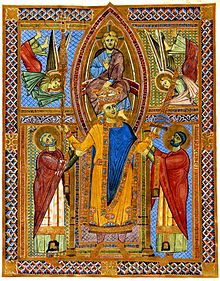Henry II, Holy Roman Emperor
| Henry II | |
|---|---|

Henry II, Holy Roman Emperor
|
|
| Holy Roman Emperor | |
| Reign | February 14, 1014 – July 13, 1024 |
| Coronation | February 14, 1014 Old St. Peter's Basilica, Rome |
| Predecessor | Otto III |
| Successor | Conrad II |
| King of Italy | |
| Reign | May 15, 1004 – July 13, 1024 |
| Coronation | May 15, 1004 Pavia, Kingdom of Italy |
| Predecessor | Otto III |
| Successor | Conrad II |
| King of Germany | |
| Reign | June 7, 1002 – July 13, 1024 |
| Coronation | June 7, 1002 Mainz, Kingdom of Germany |
| Predecessor | Otto III |
| Successor | Conrad II |
| Duke of Bavaria | |
| Reign | 995–1004 |
| Predecessor | Henry II |
| Successor | Henry V |
| Born | May 6, 973 Abbach,Bavaria, Germany, Holy Roman Empire |
| Died | July 13, 1024 (aged 51) near Göttingen, Germany, Holy Roman Empire |
| Burial | Bamberg Cathedral |
| Spouse | Cunigunde of Luxembourg |
| House | Ottonian |
| Father | Henry II, Duke of Bavaria |
| Mother | Gisela of Burgundy |
| Religion | Roman Catholic |
Henry II (German: Heinrich II; Italian: Enrico II) (6 May 973 – 13 July 1024), also known as Saint Henry, Obl. S. B., was Holy Roman Emperor ("Romanorum Imperator") from 1014 until his death in 1024 and the last member of the Ottonian dynasty of Emperors as he had no children. The Duke of Bavaria from 995, Henry became King of Germany ("Rex Romanorum") following the sudden death of his second cousin, Emperor Otto III in 1002, was crowned King of Italy ("Rex Italiae") in 1004, and was crowned by the Pope as Emperor in 1014.
The son of Henry II, Duke of Bavaria and his wife Gisela of Burgundy, Emperor Henry II was a great-grandson of German King Henry I and a member of the Bavarian branch of the Ottonian dynasty. Since his father had rebelled against two previous emperors, the younger Henry was often in exile. This led him to turn to the Church at an early age, first finding refuge with the Bishop of Freising and later being educated at the cathedral school of Hildesheim. He succeeded his father as Duke of Bavaria in 995 as "Henry IV". As Duke, he attempted to join his second-cousin, Holy Roman Emperor Otto III, in suppressing a revolt against imperial rule in Italy in 1002. Before Henry II could arrive, however, Otto III died of fever, leaving no heir. After defeating several other claimants to the throne, Henry II was crowned as King of Germany ("Rex Romanorum") on July 9, 1002 and as King of Italy ("Rex Italiae") on 15 May 1004. Henry II in 1004 aided Jaromír, Duke of Bohemia against the Poles, definitively incorporating the Duchy of Bohemia into the Holy Roman Empire.
...
Wikipedia
